Femia > Health Library > Your cycle > Health > Early signs of pregnancy after IUD removal: What to expect
Early signs of pregnancy after IUD removal: What to expect
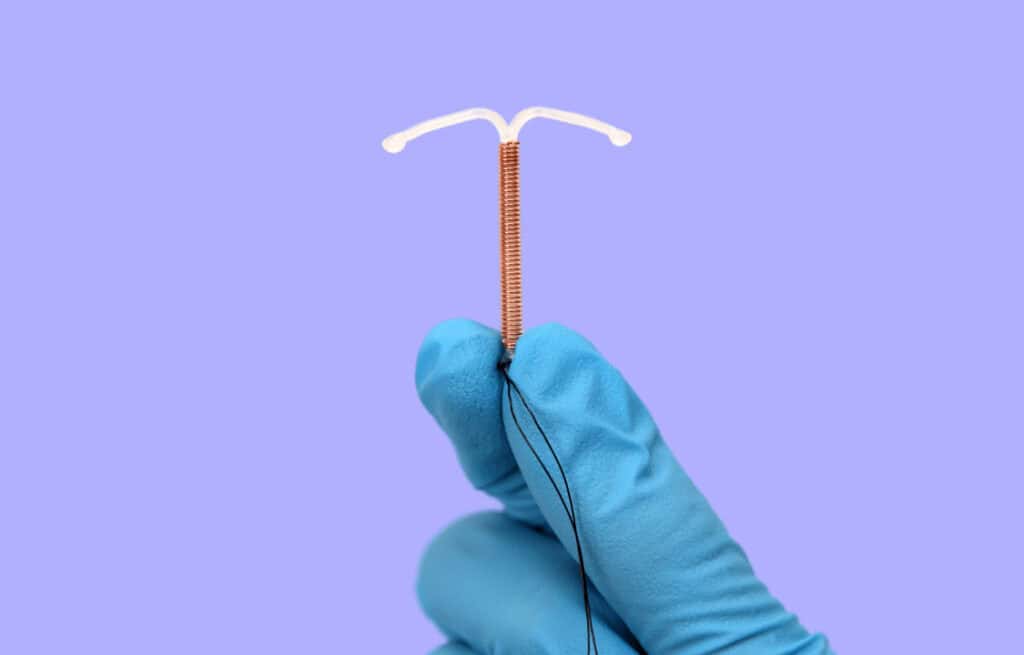
- Updated Feb 28, 2025
- Published
CRAFTED BY HUMAN
Crafted by human At Femia, we provide accurate and up-to-date information at every stage of your journey, from trying to conceive, pregnancy and postnatal support. All content is created by a real person based on in-depth research and own professional experience. Femia ensures that you will receive expert advice, strict accuracy and a personalized approach from our authors/medical experts. Learn more about our editorial policy.
FACT CHECKED
Fact checked At Femia Health, we maintain the highest standards of editorial excellence in delivering content focused on helping you conceive, guiding you through pregnancy, and supporting you postpartum. Explore our content review principles to learn how we ensure the accuracy and quality of our health and lifestyle tips for every stage of your journey.
After removal of an intrauterine device (IUD), your fertility should quickly return to normal, and it is even possible to conceive during the first cycle after removal. Your recent IUD removal won’t impact your early pregnancy symptoms, so you should look out for the usual signs. These include a missed period, breast tenderness, fatigue, nausea and sickness, and needing to pee more often.
If you recently stopped birth control to start trying for a baby, you may be wondering what the early signs of pregnancy are after IUD removal. The two-week wait can feel much longer, as you second guess every feeling in your body to determine whether it’s an early sign of pregnancy.
An IUD is an effective and temporary form of birth control; however, there are misconceptions that an IUD can impact your long-term fertility. Knowing how your IUD works will give you a greater understanding of your fertility after removal.
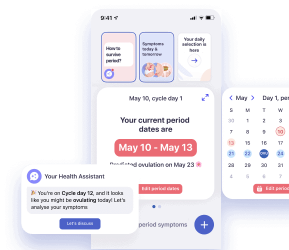
How long after IUD removal can you get pregnant?
The return to fertility after IUD removal varies depending on several factors, including the individual’s medical history, age, genetic factors, how long they used the IUD, and their previous parity.
The type of IUD also plays a role in this process:
- Hormonal IUDs (Mirena, Skyla, Kyleena): These can sometimes inhibit ovulation, but not always. For instance, the Mirena IUD can stop ovulation in some people. According to the manufacturer, about 45% of menstrual cycles were ovulatory in a 1-year study, and after 4 years, 75% of cycles were ovulatory. While you could get pregnant right away after removal, it is also normal if it takes some time.
- Copper IUDs: These do not affect ovulation, and fertility generally returns quickly after removal.
If you’re wondering if you can get pregnant one week after IUD removal, the general answer is yes. As soon as your IUD is removed, you should be able to get pregnant, which is great news if you’re ready to start a family. It may not happen right away but up to 90% of people under the age of 35 conceive within a year.
There are two main types, hormonal and copper, and both work in different ways. We’ll discuss these differences below, as well as how they impact your chances of getting pregnant quickly after removal.
1. Hormonal IUD
A hormonal IUD works by releasing progestin, which thickens the cervical mucus, making it more difficult for sperm to reach the egg. It also thins the lining of your uterus to make it more difficult for a fertilized egg to attach, further reducing the risk of pregnancy.
If you had the hormonal IUD, it may take several days or weeks for the hormones to work their way out of your body, but it is still possible to conceive during the first cycle after removal.
A 2018 research review published in Contraception and Reproductive Medicine found that eight in 10 women got pregnant within one year of IUD removal. The researchers found that the type of IUD didn’t impact how long it took for pregnancy to occur.
2. Copper IUD
The copper IUD releases copper into the uterus, which is toxic to sperm and prevents them from being able to survive in the uterus. The copper IUD is an excellent choice for women who don’t want to use hormonal contraceptives. And, since no hormones are involved that may linger in your system, you will be able to conceive almost right away after taking it out.
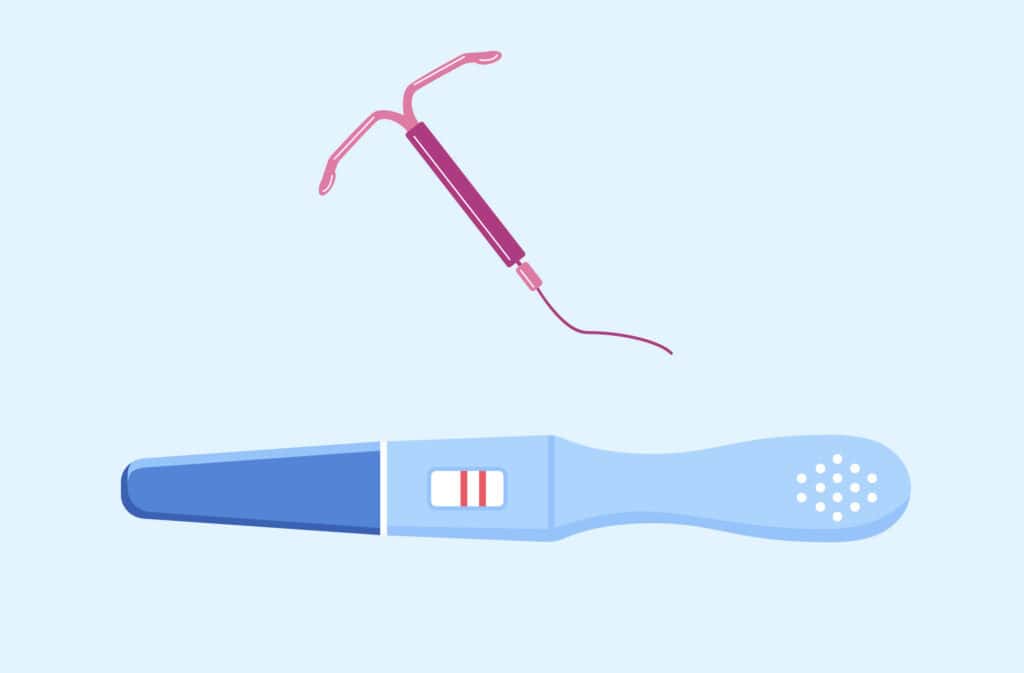
Understanding pregnancy timing after IUD removal
For most women, IUD removal is a simple procedure that is over in minutes. As soon as you have your IUD taken out and the device is no longer turning your uterus into an inhospitable environment for sperm, you should theoretically be able to fall pregnant.
You may notice some light spotting after your IUD removal, but this is usually nothing to worry about. Your healthcare provider can remove your IUD at any point during your cycle, and you may be able to conceive very soon.
A 2015 study into fertility found that previous IUD use did not impact conception rates compared to users of other contraceptive methods. The study also found no difference in how long each group took to fall pregnant: the pregnancy rates at 12 months were comparable between 81% of women using IUDs became pregnant compared to 70% of those who did not use IUDs (p=0.18). The researchers did note lower fertility levels amongst African American participants, but this was thought to be due to lower fertility levels in African American women in general and not related to their use of contraceptives.

Can you get pregnant immediately after IUD removal?
There are whisperings that having an IUD can impact your long-term fertility, but these old wives’ tales are unfounded. Your fertility should return to normal as soon as the IUD is taken out.
However, while your fertility may immediately return, that doesn’t mean you’ll fall pregnant in the first month of trying. Note, that it does take some time for the endometrium to stabilize (in the case of the LNG-IUD) and for the copper ions to dissipate (for the copper IUD).
Also, the time it takes to conceive is dependent on several factors, including age, reproductive health, and how often you have sex. Most couples will fall pregnant within one year of trying if they have regular unprotected sex.
According to the American College of Obstetricians and Gynaecologists, around half of all healthy couples conceive within six months. So, if you haven’t conceived within a year of trying, you should make an appointment to see your doctor. However, this timeline varies slightly with age and other factors that can impact fertility.
If you are 35 to 39 years old, you should seek help after six months of trying if you haven’t conceived. If you are 40 or above, you should schedule an appointment with your healthcare provider sooner. And, if you have an underlying condition that may impact fertility, such as PCOS or endometriosis, you should speak to your healthcare provider as soon as possible.
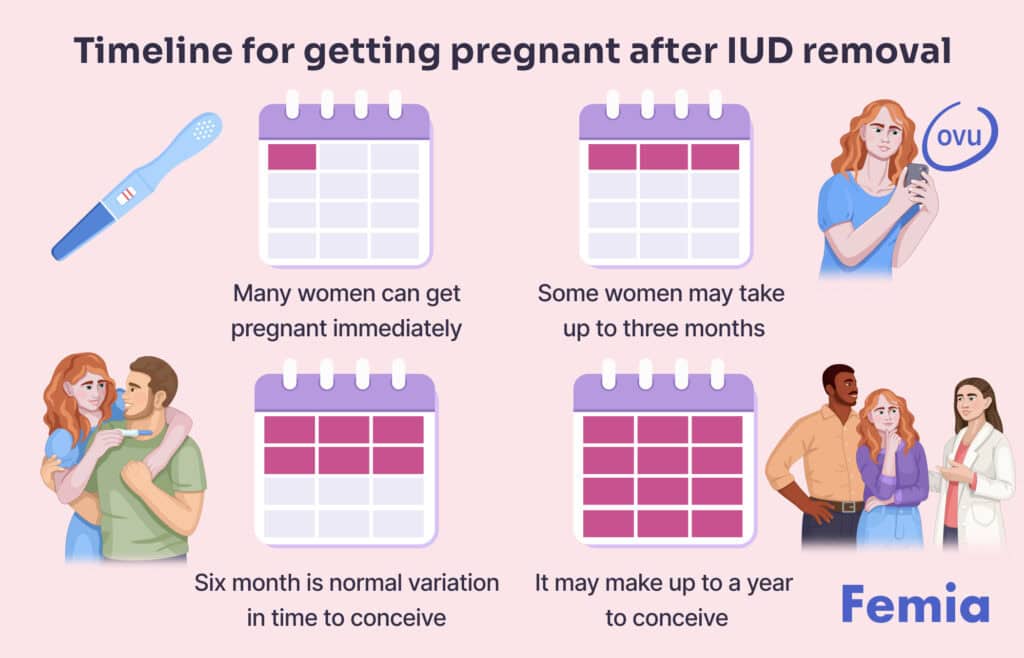
Early signs of pregnancy after IUD removal
Recently having an IUD removed will not impact your early signs of pregnancy; they will be the same as if you’d never had an IUD. Here are some of the early signs of pregnancy to look out for:
- A missed period;
- “Morning” sickness (can occur at any time);
- Tender, firm breasts;
- Fatigue;
- Needing to pee more often;
- Food and smell aversions and cravings.
Though fatigue and tender breasts are common premenstrual syndrome (PMS) symptoms, you are likely to notice similar, more intense symptoms during early pregnancy. The tender breasts of PMS pale in comparison with early pregnancy breasts that feel sore when your t-shirt brushes against them.
Symptoms vary for everyone, so you may not notice all (or any) of the above. A home pregnancy test is the easiest way to determine whether you’re pregnant. These are most accurate on or after what should have been the first day of your missed period. Make sure you follow the instructions carefully to ensure an accurate result.
What to expect when trying to conceive after copper IUD removal
You can start trying to conceive after copper IUD removal immediately. The copper creates a toxic environment for the sperm, preventing them from finding and fertilizing the egg. As soon as the copper IUD is removed, so too is the hostile environment created by the copper.
Thanks to the fast return of fertility, there’s no need to have your copper IUD removed in advance; you can ask your doctor to remove it as soon as you’re ready to start a family.
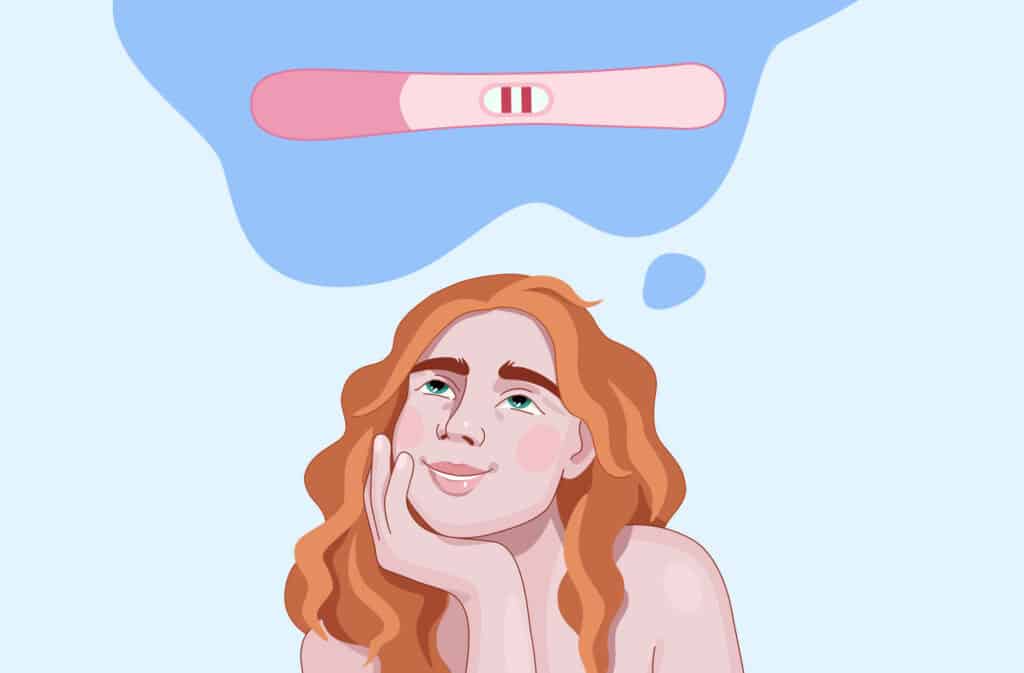
Pregnancy after IUD removal: what next?
If you think you might be pregnant, it’s important to confirm the pregnancy with a home pregnancy test or blood test.
- Home pregnancy test. If it has been a few weeks since your IUD removal and you suspect you might be pregnant, a simple home pregnancy test can help confirm your status. For the most accurate results, follow the instructions carefully and wait until the first day of your missed period before testing.
- Healthcare provider. For immediate concerns or if you suspect pregnancy right after IUD removal, schedule an appointment with your healthcare provider. A blood test can confirm pregnancy sooner than a home test and provide more immediate guidance.
If you receive a positive pregnancy test result, congratulations, you’re pregnant! It’s time to contact your healthcare provider and request a prenatal appointment. In the meantime, you should start taking a daily prenatal vitamin supplement that contains folic acid, which is essential for the healthy growth of your baby during these very early weeks of pregnancy.
Questions from the Femia community
Is it harder to conceive after having an IUD?
No, IUD users do not take longer to conceive after removal. How long it takes you to conceive may depend on your age, reproductive health, and how often you have unprotected sex. A 2020 study published in the British Medical Journal found that, when considering long-term contraceptive methods, fertility returned fastest for IUD users and slowest for users of the contraceptive shot. It's important to remember that fertility can vary widely among women, and consulting a healthcare provider can provide personalized guidance.
Are there any risks associated with getting pregnant right after IUD removal?
No, there are no risks to getting pregnant soon after your IUD removal. The hormonal IUD works in part by thinning the lining of the uterus, so some obstetricians recommend waiting a couple of cycles to give your uterine lining time to build up again. You should speak to your healthcare provider for personalized conception advice, but generally speaking, there is no need to wait after your IUD removal—in fact, this is one of the benefits of using an IUD.
How reliable are home pregnancy tests after IUD removal?
Home pregnancy tests are generally reliable when used correctly. They detect the presence of hCG (human chorionic gonadotropin) hormone in urine, produced during pregnancy. You should follow the test instructions carefully, and consider confirming results with a healthcare provider if unsure.
What should I do if I don’t get pregnant within a few months of IUD removal?
Around a third of couples fall pregnant during the first month of trying, but for others, it can take longer. There’s no need to panic if you’ve been trying for a couple of months; most couples fall pregnant within one year, so try to be patient.
If you have underlying health conditions such as endometriosis or other factors that may impact fertility, you should seek advice sooner. If not, you can wait until the one year mark before speaking to your doctor for advice. If you are age 35 or over, you can seek help after six months of trying. If you’re age 40 and above, it’s worth contacting your doctor sooner.
Is it normal to have irregular periods after IUD removal?
The hormones in your hormonal IUD can take a short time to leave your body. In the meantime, these hormones may impact your menstrual cycle. Some women notice irregular periods or changes to their menstrual cycle after IUD removal. This usually resolves itself within a couple of months. However, if you also notice severe pain or excessive bleeding, you should contact your doctor for advice.
The bottom line
Your fertility should return soon after having your IUD removed; this means you may be able to fall pregnant that same month, depending on where in your cycle you are at the time of removal. Pay close attention to your cycle, and look out for any early signs of pregnancy. If you think you might be pregnant, take a home pregnancy test on or after the day of your missed period.
If you have difficulty getting pregnant after IUD removal, it won’t be down to the IUD but another factor. Make an appointment with your healthcare provider to discuss your fertility if you are worried about how long you’ve been trying to conceive.
References
- Girum, T., Wasie, A. ‘Return of fertility after discontinuation of contraception: a systematic review and meta-analysis.’ Contracept Reprod Med 3, 9 (2018). https://doi.org/10.1186/s40834-018-0064-y.
- Stoddard et al ‘Fertility after Intrauterine Device Removal: A Pilot Study’ The European Journal of Contraception & Reproductive Health Care Volume 20 (2015). https://www.tandfonline.com/doi/full/10.3109/13625187.2015.1010639.
- Yland et al ‘Pregravid contraceptive use and fecundability: prospective cohort study’ BMJ (2020); 371 doi: https://doi.org/10.1136/bmj.m3966.
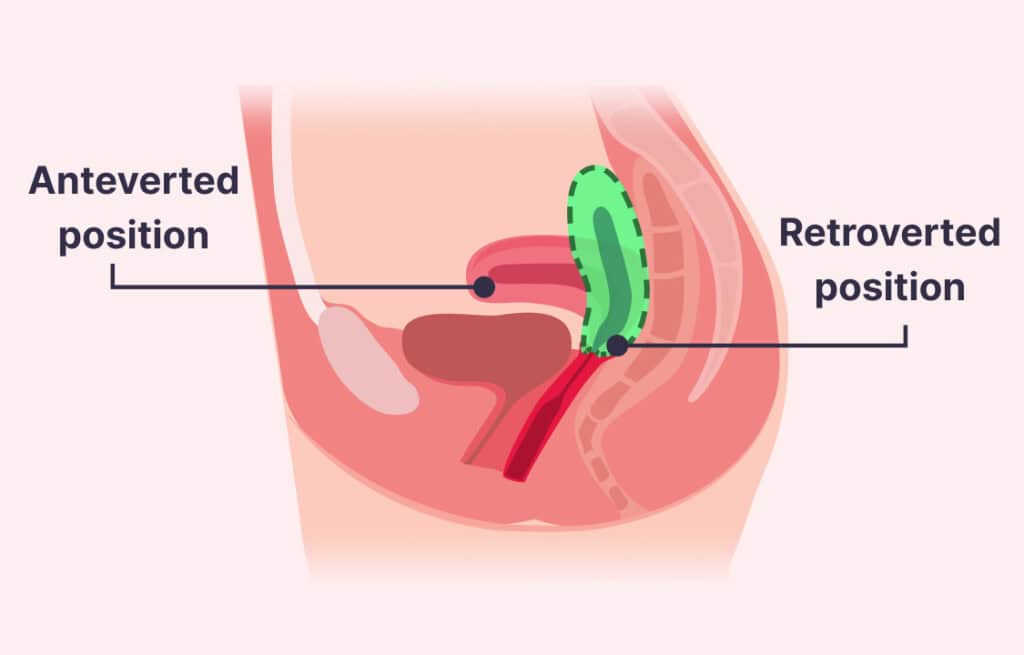
How to get pregnant fast with a retroverted uterus? Discover symptoms, impact on fertility, expert tips, and the best sex positions to improve your chances of conception.
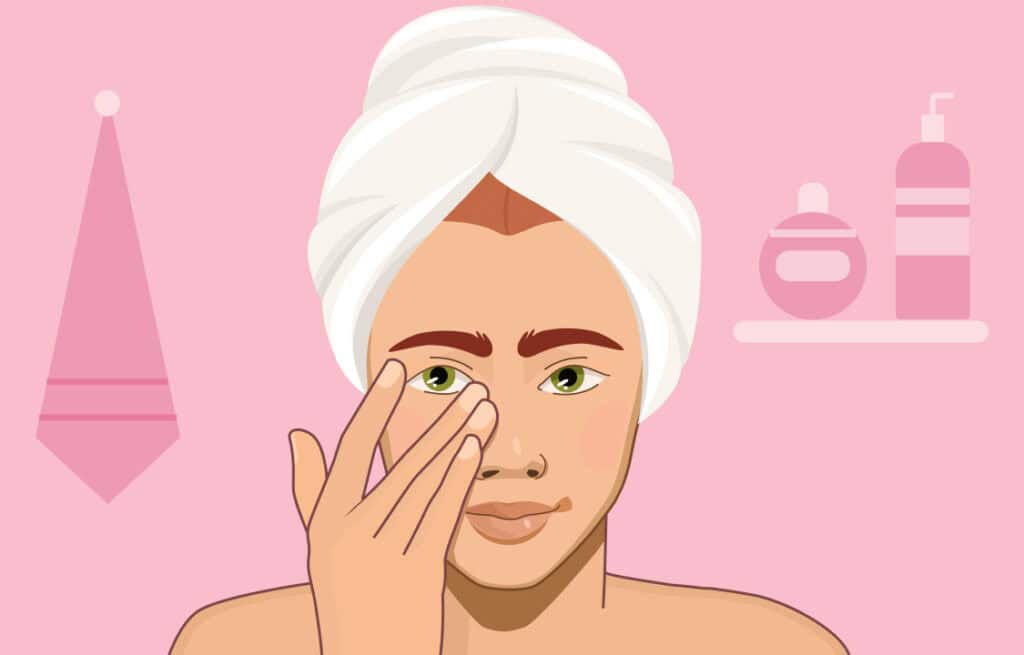
Discover the facts about this cosmetic procedure while expecting or nursing a baby, and explore safe alternatives to keep your skin healthy and glowing.
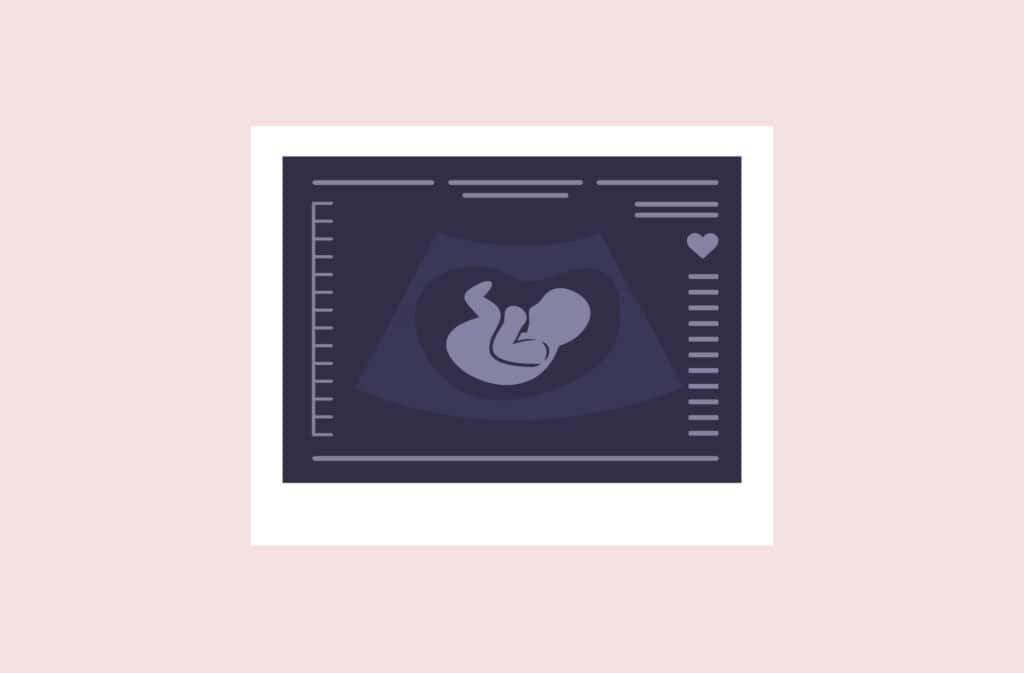
Compare Down syndrome ultrasound vs normal scans. Learn 8 key signs, including nasal bone differences. Discover what abnormalities can be seen at 12-week and 20-week scans. Expert insights from Femia.

